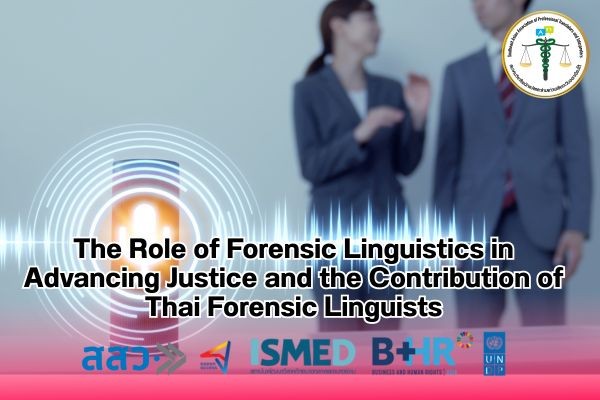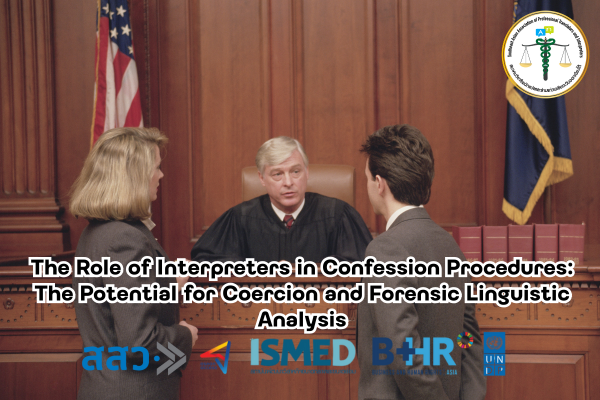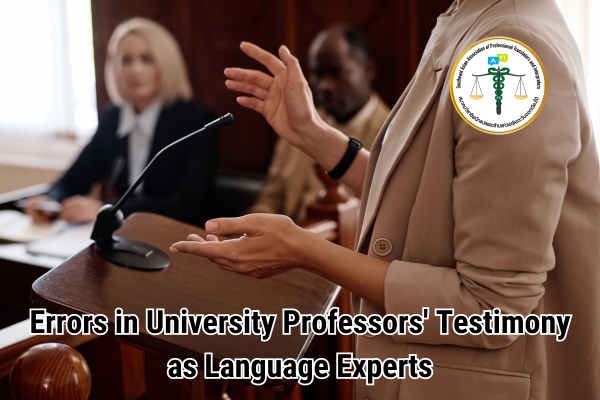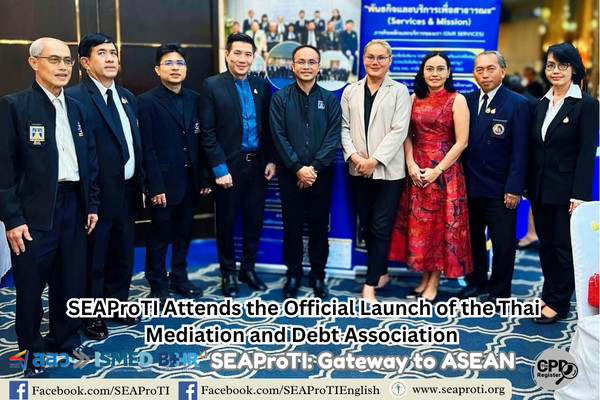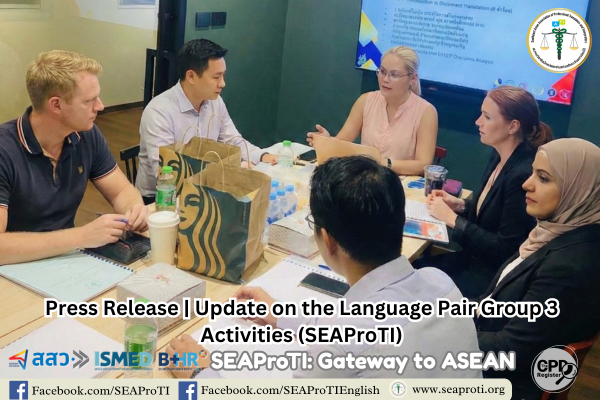The Role of Forensic Linguistics in Advancing Justice and the Contribution of Thai Forensic Linguists
under the Southeast Asian Association of Professional Translators and Interpreters (SEAProTI)
6 July 2025, Bangkok – Forensic linguistics is the application of linguistic knowledge to legal contexts, encompassing criminal and civil investigations, courtroom procedures, and the interpretation of legal documents. It is a subfield of applied linguistics that examines the intersection of language and law. This article presents an overview of forensic linguistics, its key methodologies, applications, and the emerging role of forensic linguists in Thailand. Special emphasis is placed on the contributions of Thai forensic linguists under the support and development of the Southeast Asian Association of Professional Translators and Interpreters (SEAProTI), who have actively participated in promoting justice, safeguarding citizens’ rights, and enhancing transparency in the Thai legal system.
1. Introduction
Forensic linguistics, a branch of applied linguistics, explores the relationship between language and the law. It draws upon linguistic theory and methods to analyze language used in legal settings, from police investigations to courtroom trials and the interpretation of legal texts. While still relatively new in Thailand, this field is gaining recognition among language professionals and legal practitioners for its importance in supporting fair and accurate legal processes.
2. Scope and Applications of Forensic Linguistics
Forensic linguistics is applied across various stages of the legal process, including:
- Authorship Identification: Comparing anonymous or disputed texts with known samples to determine likely authorship, often used in threat letters or defamatory messages.
- Forensic Stylistics: Examining writing style to detect plagiarism or to identify the writer’s linguistic fingerprint.
- Forensic Phonetics (Voice Identification): Analyzing vocal characteristics to match a suspect’s voice to recorded audio.
- Discourse Analysis: Studying the structure and language of communication to assess meaning, involvement, or coercion.
- Legal Language Interpretation: Clarifying ambiguous statutory language, contracts, or witness statements.
- Courtroom Language Analysis: Investigating the linguistic strategies used by judges, attorneys, and witnesses during legal proceedings.
- Trademark and Intellectual Property Disputes: Evaluating language in branding and advertising for potential copyright or trademark violations.
- Language Analysis in Asylum Cases: Using linguistic evidence to verify the origin of asylum seekers.
- Comprehension Assessment: Determining whether suspects or witnesses fully understood their legal rights or the questions posed by authorities.
3. Methodologies in Forensic Linguistic Analysis
Forensic linguists employ scientific methods grounded in linguistic theory, such as:
- Comparative Linguistics: Comparing grammatical structures, vocabulary, and syntax across texts.
- Corpus Analysis: Using linguistic databases to analyze word frequency and patterns in legal or disputed texts.
- Phonetic and Accent Analysis: Identifying the speaker’s identity or regional origin through speech analysis.
- Dialectal and Sociolectal Analysis: Determining the speaker’s background based on linguistic features.
4. Professional Roles and Practice
Forensic linguists often serve as expert witnesses in court, offering professional opinions on language evidence to either the prosecution or defense. Many also work as consultants for law enforcement, attorneys, and government agencies, while some hold academic positions. In Thailand, SEAProTI has been instrumental in nurturing this profession by developing training programs, providing certification, and raising awareness of forensic linguistic services.
5. The Role of Thai Forensic Linguists under SEAProTI
The Southeast Asian Association of Professional Translators and Interpreters (SEAProTI) plays a pivotal role in advancing the work of Thai forensic linguists through:
- Professional Training Programs: Offering specialized courses on document analysis, linguistic profiling, and expert testimony.
- Consultation Services: Assisting state agencies and judicial bodies with legal language interpretation and expert analysis.
- Public Education and Advocacy: Raising awareness of the role of language in legal justice and promoting best practices.
- Ethical Standards Development: Upholding the scientific integrity and neutrality of linguistic evidence through a professional code of ethics.
6. Conclusion
Forensic linguistics plays a crucial role in delivering justice by offering scientific, objective analysis of language evidence. In Thailand, the contributions of trained and certified forensic linguists—particularly those supported by SEAProTI—have been significant in enhancing the accuracy and fairness of legal proceedings. As the field continues to grow, so too does its impact on safeguarding human rights, strengthening legal systems, and promoting linguistic equity.
References
- Coulthard, M., & Johnson, A. (2007). An Introduction to Forensic Linguistics: Language in Evidence. Routledge.
- Olsson, J. (2008). Forensic Linguistics: An Introduction to Language, Crime and the Law. Continuum.
- Gibbons, J. (2003). Forensic Linguistics: An Introduction to Language in the Justice System. Blackwell Publishing.
- Southeast Asian Association of Professional Translators and Interpreters (SEAProTI). (2024). Professional Code of Ethics for Translators and Interpreters.
- Svartvik, J. (1968). The application of linguistic knowledge in forensic contexts. Research Report, Lund University, Sweden.
SEAProTI’s certified translators, translation certification providers, and certified interpreters:
The Southeast Asian Association of Professional Translators and Interpreters (SEAProTI) has officially announced the criteria and qualifications for individuals to register as “Certified Translators,” “Translation Certification Providers,” and “Certified Interpreters” under the association’s regulations. These guidelines are detailed in Sections 9 and 10 of the Royal Thai Government Gazette, issued by the Secretariat of the Cabinet under the Office of the Prime Minister of the Kingdom of Thailand, dated July 25, 2024, Volume 141, Part 66 Ng, Page 100. the Royal Thai Government Gazette
บทบาทของนิติภาษาศาสตร์ในการอำนวยความยุติธรรม และการขับเคลื่อนโดยนักนิติภาษาไทย
ในสมาคมวิชาชีพนักแปลและล่ามแห่งเอเชียตะวันออกเฉียงใต้
6 กรกฎาคม 2568, กรุงเทพมหานคร – นิติภาษาศาสตร์ (Forensic Linguistics) คือการประยุกต์ใช้ความรู้ทางภาษาศาสตร์ในบริบททางกฎหมาย ทั้งในคดีอาญาและคดีแพ่ง โดยครอบคลุมการวิเคราะห์ข้อความ การตรวจสอบตัวตนผู้เขียน การตีความกฎหมาย และการประเมินความเข้าใจในกระบวนการยุติธรรม บทความนี้นำเสนอภาพรวมของศาสตร์นิติภาษาศาสตร์ ทั้งในด้านวิธีวิทยา การประยุกต์ใช้ และบทบาทของนักนิติภาษาในประเทศไทย โดยเน้นย้ำถึงบทบาทสำคัญของนักนิติภาษาไทยที่ได้รับการส่งเสริมและสนับสนุนจากสมาคมวิชาชีพนักแปลและล่ามแห่งเอเชียตะวันออกเฉียงใต้ (SEAProTI) ซึ่งมีส่วนร่วมในการอำนวยความยุติธรรม การปกป้องสิทธิของประชาชน และการส่งเสริมความโปร่งใสในกระบวนการยุติธรรมไทย
1. บทนำ
นิติภาษาศาสตร์เป็นแขนงหนึ่งของภาษาศาสตร์ประยุกต์ (Applied Linguistics) ที่มุ่งศึกษาปฏิสัมพันธ์ระหว่างภาษาและกฎหมาย โดยนำองค์ความรู้ด้านภาษาศาสตร์มาช่วยในการสืบสวน สอบสวน วิเคราะห์พยานหลักฐานทางภาษา ตลอดจนการทำหน้าที่เป็นพยานผู้เชี่ยวชาญในศาล สำหรับประเทศไทย แม้ศาสตร์นี้จะยังถือว่าใหม่ในแวดวงวิชาการและกฎหมาย แต่ได้รับความสนใจเพิ่มขึ้นอย่างต่อเนื่อง โดยเฉพาะในกลุ่มผู้เชี่ยวชาญด้านภาษาและนักกฎหมายที่เล็งเห็นความสำคัญของการใช้ภาษาอย่างมีนัยสำคัญในกระบวนการยุติธรรม
2. ขอบเขตและการประยุกต์ใช้นิติภาษาศาสตร์
การใช้นิติภาษาศาสตร์มีความหลากหลาย ครอบคลุมทั้งในระดับการสืบสวนสอบสวน การดำเนินคดีในศาล และการตีความเอกสารทางกฎหมาย ตัวอย่างการประยุกต์ใช้มีดังนี้:
- การระบุผู้เขียนข้อความ (Authorship Identification): ใช้เปรียบเทียบข้อความที่ไม่ทราบผู้เขียนกับข้อความที่ทราบตัวตน เพื่อหาความเป็นไปได้ว่าเป็นบุคคลเดียวกันหรือไม่ เช่น คดีจดหมายขู่หรือข้อความหมิ่นประมาท
- การวิเคราะห์สำนวนภาษา (Forensic Stylistics): ใช้ตรวจสอบการลอกเลียนผลงาน หรือวิเคราะห์ลักษณะการเขียนที่อาจเป็นหลักฐานในคดี
- การพิสูจน์เสียง (Forensic Phonetics): วิเคราะห์เสียงพูดเพื่อระบุตัวบุคคลในบันทึกเสียง
- การวิเคราะห์วาทกรรม (Discourse Analysis): ศึกษาโครงสร้างของการสื่อสารในบริบทคดี เช่น การซักถาม การรับสารภาพ
- การตีความภาษากฎหมาย: ช่วยตีความข้อความในกฎหมาย สัญญา หรือคำให้การที่มีความกำกวมหรือซับซ้อน
- การวิเคราะห์ภาษาของพยานในศาล: ศึกษาวิธีการใช้ภาษาในกระบวนการพิจารณาคดี เพื่อประเมินความเป็นกลาง ความเข้าใจ หรือแรงจูงใจของผู้พูด
- การตรวจสอบเครื่องหมายการค้าและทรัพย์สินทางปัญญา: วิเคราะห์การใช้ภาษาที่อาจละเมิดลิขสิทธิ์ หรือก่อให้เกิดความเข้าใจผิดในแบรนด์หรือโฆษณา
- การวิเคราะห์ภาษาสำหรับผู้อพยพหรือผู้ลี้ภัย: เพื่อระบุแหล่งกำเนิดทางภาษาศาสตร์ในกรณีขอลี้ภัย
- การประเมินความเข้าใจทางกฎหมาย: ตรวจสอบว่าผู้ต้องสงสัยเข้าใจสิทธิตนเองหรือคำถามจากเจ้าหน้าที่หรือไม่
3. วิธีวิทยาในการวิเคราะห์
นักนิติภาษาศาสตร์ใช้เทคนิคหลากหลายที่มีรากฐานจากการวิจัยภาษาศาสตร์ เช่น:
- การวิเคราะห์เปรียบเทียบทางภาษาศาสตร์: เปรียบเทียบข้อความในแง่ของไวยากรณ์ การใช้คำ และโครงสร้างประโยค
- การใช้คลังข้อมูลภาษา (Corpus Analysis): ศึกษาความถี่ของคำหรือรูปแบบภาษาที่ปรากฏในหลักฐาน
- การวิเคราะห์เสียงและสำเนียง: เพื่อพิสูจน์ความเป็นเจ้าของเสียง หรือสำเนียงเฉพาะถิ่น
- การวิเคราะห์ภาษาถิ่นและระดับภาษา: เพื่อระบุภูมิหลังของผู้พูด
4. บทบาทและการปฏิบัติวิชาชีพ
นักนิติภาษาศาสตร์มักทำหน้าที่เป็นพยานผู้เชี่ยวชาญในศาล และเป็นที่ปรึกษาแก่ตำรวจ อัยการ ทนายความ หรือหน่วยงานรัฐอื่น ๆ หลายคนดำรงตำแหน่งอาจารย์หรือวิจัยในมหาวิทยาลัย และบางส่วนสังกัดองค์กรวิชาชีพ เช่น SEAProTI ซึ่งมีการพัฒนาหลักสูตรฝึกอบรมและรับรองความสามารถทางนิติภาษาศาสตร์สำหรับผู้ที่สนใจเข้าสู่วิชาชีพ
5. บทบาทของนักนิติภาษาไทยใน SEAProTI
สมาคมวิชาชีพนักแปลและล่ามแห่งเอเชียตะวันออกเฉียงใต้ (SEAProTI) ได้ริเริ่มและส่งเสริมบทบาทของนักนิติภาษาในประเทศไทยอย่างเป็นรูปธรรม ได้แก่:
- การจัดอบรมเชิงวิชาชีพ เกี่ยวกับการวิเคราะห์เอกสาร พฤติกรรมทางภาษา และการเตรียมตัวเป็นพยานผู้เชี่ยวชาญ
- การให้คำปรึกษาด้านภาษากฎหมายและภาษาศาล แก่หน่วยงานรัฐและองค์กรยุติธรรม
- การเผยแพร่ความรู้สู่สาธารณะ เพื่อสร้างความตระหนักรู้เกี่ยวกับความสำคัญของภาษาในกระบวนการยุติธรรม
- การส่งเสริมจรรยาบรรณวิชาชีพ เพื่อให้นักนิติภาษาไทยยึดหลักวิทยาศาสตร์และความเป็นกลางในการทำงาน
6. สรุป
นิติภาษาศาสตร์มีบทบาทสำคัญในการสนับสนุนความยุติธรรม โดยใช้วิธีการวิเคราะห์ภาษาที่แม่นยำและมีหลักฐานทางวิทยาศาสตร์มารองรับ บทบาทของนักนิติภาษาไทย โดยเฉพาะผู้ที่ได้รับการฝึกอบรมและรับรองจาก SEAProTI มีศักยภาพในการช่วยเหลือสังคมทั้งในแง่การให้คำปรึกษาทางกฎหมาย การทำหน้าที่ในศาล และการส่งเสริมการใช้ภาษาที่ถูกต้องและเที่ยงธรรมในกระบวนการยุติธรรม
บรรณานุกรม (References)
- Coulthard, M., & Johnson, A. (2007). An Introduction to Forensic Linguistics: Language in Evidence. Routledge.
- Olsson, J. (2008). Forensic Linguistics: An Introduction to Language, Crime and the Law. Continuum.
- Gibbons, J. (2003). Forensic Linguistics: An Introduction to Language in the Justice System. Blackwell Publishing.
- สมาคมวิชาชีพนักแปลและล่ามแห่งเอเชียตะวันออกเฉียงใต้ (SEAProTI). (2567). คู่มือจรรยาบรรณนักแปลและนักล่ามมืออาชีพ.
- ศวาร์ตวิค, ยาน. (1968). การใช้ภาษาศาสตร์ในทางนิติวิทยาศาสตร์. รายงานการวิจัย, มหาวิทยาลัยลุนด์ ประเทศสวีเดน.
เกี่ยวกับนักแปลรับรอง ผู้รับรองการแปล และล่ามรับรองของสมาคมวิชาชีพนักแปลและล่ามแห่งเอเชียตะวันออกเฉียงใต้
สมาคมวิชาชีพนักแปลและล่ามแห่งเอเชียตะวันออกเฉียงใต้ (SEAProTI) ได้ประกาศหลักเกณฑ์และคุณสมบัติผู้ที่ขึ้นทะเบียนเป็น “นักแปลรับรอง (Certified Translators) และผู้รับรองการแปล (Translation Certification Providers) และล่ามรับรอง (Certified Interpreters)” ของสมาคม หมวดที่ 9 และหมวดที่ 10 ในราชกิจจานุเบกษา ของสำนักเลขาธิการคณะรัฐมนตรี ในสำนักนายกรัฐมนตรี แห่งราชอาณาจักรไทย ลงวันที่ 25 ก.ค. 2567 เล่มที่ 141 ตอนที่ 66 ง หน้า 100 อ่านฉบับเต็มได้ที่: นักแปลรับรอง ผู้รับรองการแปล และล่ามรับรอง


